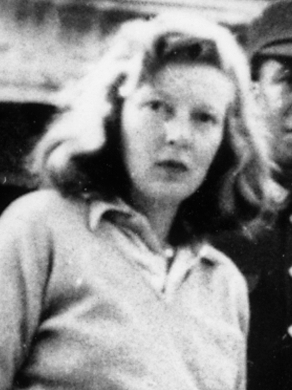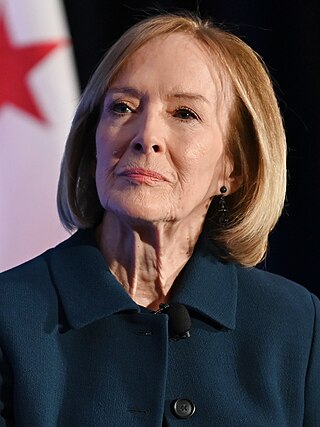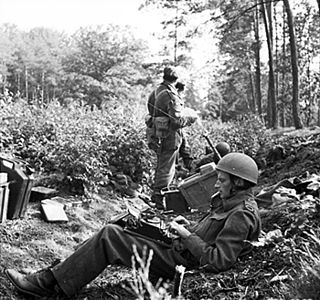
A journalist is a person who gathers information in the form of text, audio or pictures, processes it into a newsworthy form and disseminates it to the public. This is called journalism.

Martha Ellis Gellhorn was an American novelist, travel writer, and journalist who is considered one of the great war correspondents of the 20th century.

Candy Alt Crowley is an American news anchor who was employed as CNN's chief political correspondent, specializing in American national and state elections. She was based in CNN's Washington, D.C. bureau and was the anchor of their Sunday morning talk show State of the Union with Candy Crowley. She has covered elections for over two decades.

Judy Carline Woodruff is an American broadcast journalist who has worked in local, network, cable, and public television news since 1970. She was the anchor and managing editor of the PBS NewsHour through the end of 2022. Woodruff has covered every presidential election and convention since 1976. She has interviewed several heads of state and moderated U.S. presidential debates.

A war correspondent is a journalist who covers stories first-hand from a war zone.

Georgette Louise Meyer known as Dickey Chapelle was an American photojournalist known for her work as a war correspondent from World War II through to her death in the Vietnam War.

Joseph Medill Patterson was an American journalist, publisher and founder of the Daily News in New York. At the time of his death the Daily News maintained a Sunday circulation of 4.5 million copies, the largest circulation of any paper in the United States.

The Murrow Boys, or Murrow's Boys, were the CBS radio broadcast journalists most closely associated with Edward R. Murrow during his time at the network, most notably in the years before and during World War II.
Homer William Bigart was an American reporter who worked for the New York Herald Tribune from 1929 to 1955 and for The New York Times from 1955 to his retirement in 1972. He was considered a "reporter's reporter" and an "enduring role model." He won two Pulitzer Prizes as a war correspondent, as well as most of the other major journalism awards.
Paul Manning was an American broadcast journalist. He worked closely with Edward R. Murrow during World War II as a correspondent for CBS Radio, and with the Mutual Broadcasting System later on in the war.

Tania Long was an American journalist and war correspondent during World War II.
Jeffrey A. Gettleman is an American Pulitzer Prize-winning journalist. Since 2018, he has been the South Asia bureau chief of The New York Times based in New Delhi. From 2006 to July 2017, he was East Africa bureau chief for The New York Times.

Women in journalism are individuals who participate in journalism. As journalism became a profession, women were restricted by custom from access to journalism occupations, and faced significant discrimination within the profession. Nevertheless, women operated as editors, reporters, sports analysts and journalists even before the 1890s in some countries as far back as the 18th-century.

Sonia Tomara was a Russian-born journalist who is regarded as the first female war correspondent of World War II. Tomara is known for her foreign and war reporting for the New York Herald Tribune. As a staff writer, she reported on the onset of World War II in Europe, including the German invasion of Poland and the fall of France. Tomara reported from India, Burma, China, Egypt, and Iran. In 1943, she covered the Tehran Conference. By 1944, Tomara had returned to Europe to report on the Normandy campaign, the liberation of Paris, and the Seventh Army's advance through Alsace.
John Parsons O'Donnell was an American political journalist primarily known for his tenure at the New York Daily News. Born in Somerville, Massachusetts, O'Donnell was the son of a doctor and pursued his education at Tufts College, graduating in 1920, followed by further studies at Harvard University.
Frank L. Kluckhohn was an author and journalist.
Price Day (1907-1978) was a war correspondent for the Baltimore Sun who won a 1949 Pulitzer Prize for International Reporting.

Dixie Tighe was an American war correspondent.
C. V. R. Thompson was a journalist from the United Kingdom, who reported from the United States from 1933 until his death in 1951. His obituary in The New York Times called him the "dean of the English newspaper corps." He served as president of the Foreign Correspondents Association.

Iris Nell Carpenter Akers was a British journalist, author and war correspondent known for her frontline publications during World War II as a female journalist. Carpenter started her writing career in 1924 but resigned from her position to focus on raising her two children. When the Second World War broke out in England, Carpenter returned to journalism and worked with the Daily Herald, the London Daily Express and as a BBC broadcaster. During the war, Carpenter and her family moved to the United States after her position as a frontline war correspondent with the British army was denied. She began to write for the Boston Globe as a journalist, and for the U.S. Office of Education. Carpenter also hosted episodes as a radio broadcaster with the Voice of America and was a member of the American Women in Radio and Television.











